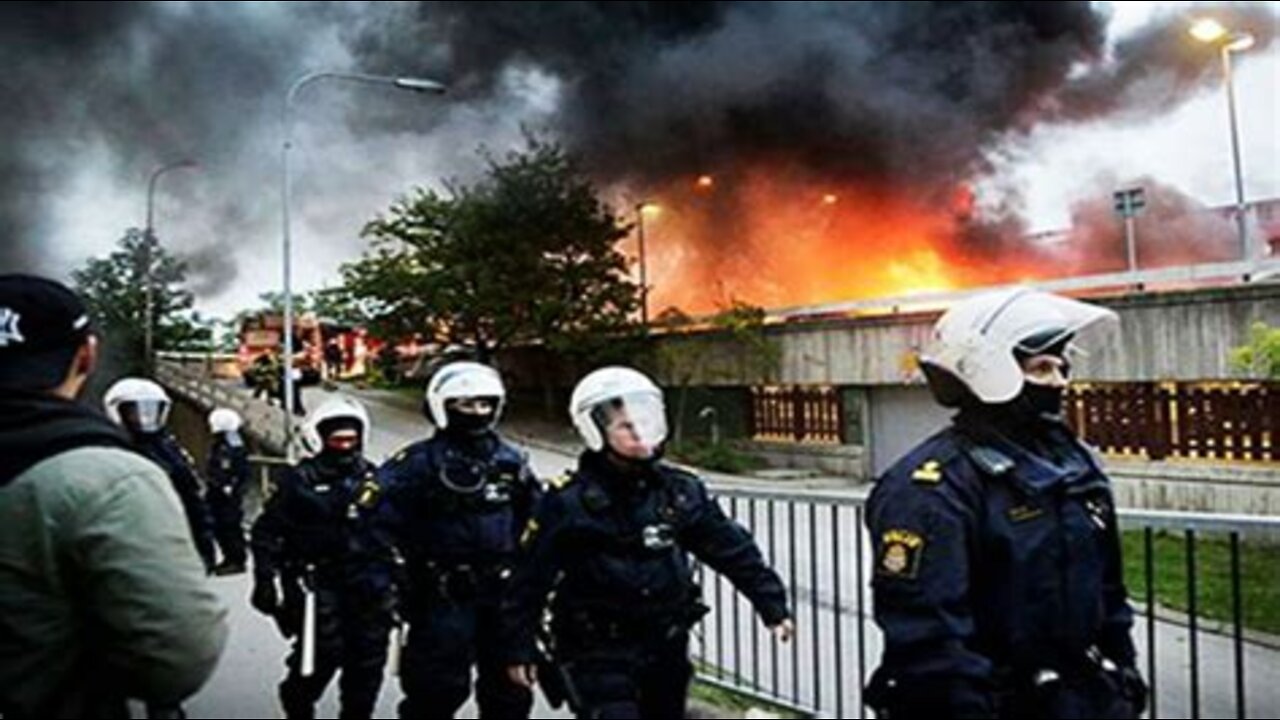Premium Only Content

Last night in Sweden Part 4
From the blogg Katerina Magasin run by an immigrant from the Czech Republic
January 20, 2022 1:34 pm
Many of us put our coffee in our mouths when yesterday a warning was sent out by the Swedish Security Service about "disinformation and propaganda in social media" which, according to the Swedish State Security Service, has increased in the ongoing pandemic. "At the moment, the Security Service is seeing an increased flow of information, particularly from right-wing extremism, on pandemic-related issues such as vaccine resistance," reads the statement on Säpo's press room. I wonder when the Swedish security police became scientific and political so that they can determine with certainty what is actually true and untrue in discussions about viruses, drugs and medicine, and how it is that they take political sides by labelling all critics of the system as right-wing extremists? Note that the security police press release says nothing about either Islamism or left-wing extremism. And that it is indirectly stated that anyone who does not accept state vaccination ideology, should be considered a security threat. The Security Service's press release was picked up by various mainstream media, including TT and of course SVT. Under the heading "Disinformation and propaganda in the wake of the pandemic", the Security Service's piece notes that "disinformation and propaganda in social media have increased" in the ongoing pandemic.
This is what the Security Service writes in the circular, which is published on the agency's press room: The Security Service has previously pointed out that both violent extremist groups and foreign powers may use the pandemic for their own purposes. At the moment, the Security Service is seeing an increased flow of information from right-wing extremists in particular on pandemic-related issues, such as resistance to vaccines. Foreign powers are also thought to be behind the spread of disinformation online. In order to reduce the opportunities for both extremist groups and foreign powers to act online, it is necessary to adopt a source-critical approach to the information that people read, like or pass on.
- Messages that are disseminated are often packaged in a way that makes it easy for people to agree, often in relation to current events or issues of concern. Anti-democratic, often false, messages are hidden in streams of accurate information, encouraging people to like, comment or share, and thus spreading the real propaganda," says Susanna Trehörning, Deputy Head of Constitutional Protection and Counterterrorism at the Swedish Security Service. One method of spreading disinformation or extremist propaganda is to put the information in comment fields in seemingly harmless posts. In this way, they spread without even being aware of what is being shared. For example, clever maths examples and picture puzzles may have been posted for purposes other than entertaining the recipient.
- The publication of the messages is rarely criminal in itself, but in the long run it undermines trust, polarises and fuels threats to democracy. To counter disinformation and extremist propaganda, it is important that we are all aware of the online practices of extremist groups and foreign powers. Source criticism and vigilance, especially online, is essential," says Susanna Trehörning.
For a country's security services to take such a clear stance against dissident voices is both remarkable and worrying. it opens the door to political persecution and suspicion of all those who challenge the state narrative. History teaches us that just because a state says one thing, it does not automatically mean that it is right, healthy, useful, just or even legal. We have countless examples in recent history of people being persecuted, imprisoned, harmed and executed for their political views. In many countries it is still forbidden to criticise those in power or religious leaders. This is what distinguishes a democratic society with freedom of expression from a totalitarian state, where only certain opinions are allowed. The fact that the Swedish security police are taking a stand against dissident voices in this way shows that socialist ideology is taking an ever stronger grip on the once free Swedish society. Here, citizens' freedom of expression is being curtailed and even relevant and healthy criticism is being labelled as "disinformation" and "propaganda".
It is important to remember here that the states that are pushing hardest for the line that Säpo is now taking, are themselves using political propaganda and disinformation to a great extent in order to strengthen their own power and scare citizens into obedience and silence. Propaganda is in fact the most effective tool of totalitarian states to keep the population in check. The second part is intimidation and fear. Threats of reprisals. Even lawsuits in which dissidents are singled out and portrayed as enemies. In the former Soviet Union, for example, the dreaded KGB engaged in these methods, persecuting dissidents. In totalitarian states, all dissenting, dissident views are considered threatening to the ruling nomenklatura and must therefore be disavowed and disarmed. By labelling systemic criticism as threatening, untrue and, above all, 'right-wing', even relevant and objective criticism is at once suspected and lumped together with violent tendencies.
The fact that the MSB has made similar statements in the past is one thing. But the fact that the Security Service has now started to use the same rhetorical approach is downright disgusting. It means that our freedom of expression is shrinking at a rapid pace and that the democracy we have become accustomed to and taken for granted is a thing of the past. When the abuse of power and its police tentacles start to encroach on people's perfectly legitimate and relevant opinions and challenges, we are in real trouble.
-
 9:27
9:27
TCougar1
3 years agoFriday night cruising -Stockholm- Sweden July 31 -20
383 -
 0:27
0:27
Op Freedom
3 years agoOttawa late last night
94914 -
 LIVE
LIVE
Kimberly Guilfoyle
33 minutes agoBREAKING NEWS on Deportations, Live with Mike Davis and Nicole Kiprilov | Ep205
6,752 watching -
 LIVE
LIVE
Kim Iversen
2 hours agoWar With Iran: Trump Marches To Israel's Drumbeat | Dictator-In-Chief? Is Trump Going Too Far?
2,165 watching -
 LIVE
LIVE
Dr Disrespect
5 hours ago🔴LIVE - DR DISRESPECT - PUBG - SNIPING ALL DAY
4,115 watching -
 52:30
52:30
Candace Show Podcast
2 hours agoStraight Husbands vs Ryan Reynolds | Tucker Carlson vs Brigitte Macron | Candace Ep 161
16.1K16 -
 1:19:24
1:19:24
vivafrei
5 hours agoBongino's Day 1 in the FBI! Swatting Frenzy? Carney & Macron Sitting in a Globalist Tree! & MORE!
80.1K73 -
 1:01:17
1:01:17
In The Litter Box w/ Jewels & Catturd
1 day agoTrump is our Lucky Charm | In the Litter Box w/ Jewels & Catturd – Ep. 763 – 3/17/2025
37.9K15 -
 15:24
15:24
Russell Brand
4 hours agoDan Crenshaw Addresses Tucker Carlson Beef
33.1K100 -
 LIVE
LIVE
Film Threat
23 hours agoVERSUS: THE SNOW WHITE STORM IS COMING | Film Threat Versus
400 watching